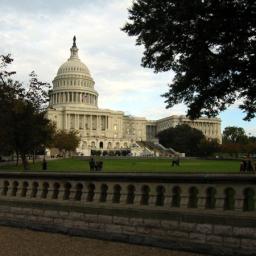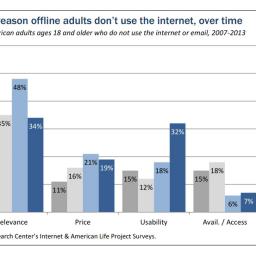
In 2011 the US Congress passed the
"America Invents Act" , a so-called "patent reform" bill that seemed more like a wish list for companies like IBM, Microsoft, and Intellectual Ventures that file lots of patents and enforce them vigorously as part (or all) of their business model. That bill was signed into law by President Obama.
A follow-up bill oriented more towards what the rest of us might consider patent reform, aimed at
protecting businesses from patent trolls and nuisance lawsuits was passed by the US House of Representatives last year by a vote of 325 to 91; it included provisions for requiring patent ownership to be more transparent, more specific language in infringement lawsuits, plaintiff liability for legal costs in unsuccessful lawsuits, delaying legal discovery during a lawsuit until the court has finished reviewing the claims, and allowing companies to protect end users against skip-level infringement lawsuits.
However, the
counterpart bill in the Senate was postponed indefinitely on Wednesday by Judiciary Committee Chairman Patrick Leahy, apparently because of infighting between the pro-reform faction (Internet companies including Google, Facebook, and Amazon; other tech companies such as Verizon; and retailers) and the go-slow faction (pharmaceutical companies, trial lawyers and universities). Here's the
statement from the universities on the postponement.
[Ed note: there seems to be general consensus that patent reform is desperately necessary to correct a deeply flawed system. But if government is unable to do it, then what do we do?]
Ladar Levinson has given an exclusive interview to the Guardian,
discussing the saga that led to his decision to shut down Lavabit , the encrypted email provider that shut operations rather than betray the contents of users' inboxes to federal agents.
Metafilter provides some interesting, ensuing commentary . In particular, there's an interesting assertion in the comments, by "jacobian":
"The lesson we've learned, over and over again, from the Snowden revelations is that the NSA hasn't been able to actually break cryptography: choose a good algorithm and a strong key, and no amount of technical work will break that crypto. What does break a cryptosystem are people. People choose bad passwords. People practice bad computer hygiene."
Is that really all it takes? Because I get the distinct impression the NSA has broken Internet encryption protocols and is busy getting all up in your stuff. Is that just what they want you to think? What's the real deal on encryption on the Internet?

Remember
Greg Chung , the Chinese spy who had infiltrated NASA and was pocketing technology for his nation of birth? It started long before that. Rewind to 2004, when the FBI, reeling from its failure to make a conviction in a previous case, was trailing Chi Mak,
a Chinese national now sporting an American passport who was working for Power Paragon, a US Navy defense contractor in California. The agents assembled the contents of the bag like a jigsaw puzzle. Patched together, the pieces constituted two documents, one handwritten and the other machine-printed. Gunnar Newquist, an investigator assigned to the case by the N.C.I.S., spotted an English phrase at the bottom of the handwritten sheet. "DDX," he said, reading it aloud. "That's a Navy destroyer." The handwritten text turned out to be a list of naval technologies and programs: submarine propulsion networks; systems for defending against nuclear, chemical, and biological attacks; and others. On the printed sheet were instructions about going to conferences to collect information. Gaylord was certain that the two documents were tasking lists from Chinese intelligence.
A great read over at the New Yorker, and a reminder that sometimes a bit of paranoia is a good thing: you may be right.

Good news for European Internet users: Europe's highest court stunned the U.S. tech industry Tuesday by recognizing an expansive right to privacy that
allows citizens to demand that Google delete links to embarrassing personal information - even if it's true.
It's going to change not only the legal climate on the 'Net but the economics, too, as cumbersome and expensive processes will be necessarily implemented in order to comply. Per the article:
The ruling has potentially wide-ranging consequences for an industry that reaps billions of dollars in profit by collecting, sorting and redistributing data touching on the lives of people worldwide. That includes more than 500 million people in the European Union who now could unleash a flood of deletion requests that Google would have little choice but to fulfill, no matter how cumbersome.
As for you people
who have never used the Internet (can you hear me?), no worries - you are safe.

Ars Technica has a
writeup detailing
Intellectual Ventures' loss in its case against Capitol One. US District Judge Anthony Trenga declared IV's patents "nothing more than the mere manipulation or reorganization of data." Between this outcome and Google's recent success in getting the venue of its battle with Rockstar Consortium changed from East Texas to California, also
covered at Ars Technica, dare we hope the tide is turning for patent trolls?

The guy
co-founded Mozilla and served as Netscape's chief architect . He
invented Javascript . He's been Mozilla's chief technical officer for 9 years. On March 24th,
Brendan Eich became the Mozilla Foundation's CEO - and members of Mozilla's staff promptly demanded that he
step down . Why?
Because Brendan Eich is anti-gay-marriage. The
BBC ,
CFO World , and
others are
reporting that online dating site OK Cupid is notifying users of Firefox of the views of the Mozilla Foundation's new CEO - and requesting that they use another browser to access the site. It's not quite a boycott - users can still click through to access the site while using Firefox - but it's definitely a statement.
This isn't the first time this kind of thing has happened.
Hobby Lobby ,
Chick-Fil-A , and
Costco have all experienced similar backlashes.
Mark Surman, XO of Mozilla, says:
"I worry that we do a bad job of explaining ourselves, that people are angry and don't know who we are or where we stand. And, I worry that in the time it takes to work this through and explain ourselves the things I love about Mozilla will be deeply damaged."
At what point do a person's political, personal, or religious views outweigh their qualifications for leadership - and does using Firefox in any way imply support of these views?

From the Washington Post:
U.S. officials announced plans Friday to relinquish federal government control over the administration of the Internet, a move that pleased international critics but alarmed some business leaders and others who rely on the smooth functioning of the Web.
Pressure to let go of the final vestiges of U.S. authority over the system of Web addresses and domain names that organize the Internet has been building for more than a decade and was supercharged by the backlash last year to revelations about National Security Agency surveillance.
The change would end the long-running contract between the Commerce Department and the Internet Corporation for Assigned Names and Numbers (ICANN), a California-based nonprofit group. That contract is set to expire next year but could be extended if the transition plan is not complete.
The announcement will move control of the authoritative root zone file, while ICANN
will be moving toward multi-stakeholder control instead of the previous US exclusive control.

Last year, the Federal Aviation Administration (FAA) issued a fine of $10,000 to Raphael Pirker, known in the drone community as "Trappy". Pirker was the first, and to date, only drone pilot fined by the FAA. The fine was
overturned yesterday by Judge Patrick Geraghty of the National Transportation Safety Board, who said in his decision that, "there was no enforceable FAA rule" governing the use of model aircraft.
"The delay in implementing an effective set of rules for [drones] has caused real potential danger, such as the thought that right now there seems to be no regulation on airspace below 400 feet."
 In 2011 the US Congress passed the "America Invents Act" , a so-called "patent reform" bill that seemed more like a wish list for companies like IBM, Microsoft, and Intellectual Ventures that file lots of patents and enforce them vigorously as part (or all) of their business model. That bill was signed into law by President Obama.
In 2011 the US Congress passed the "America Invents Act" , a so-called "patent reform" bill that seemed more like a wish list for companies like IBM, Microsoft, and Intellectual Ventures that file lots of patents and enforce them vigorously as part (or all) of their business model. That bill was signed into law by President Obama.




